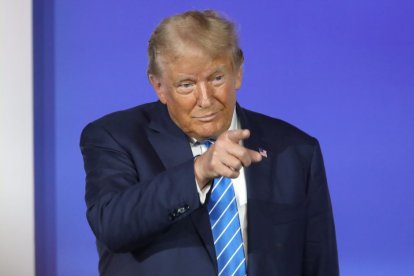Trump was banned from Twitter even though employees found no violation of rules
Journalist Bari Weiss recounted that the decision came shortly after staff concluded that no policies had been violated.

(Cordon Press)
This Monday, journalist Bari Weiss published the fifth installment of the "Twitter Files" focused on the removal of Trump's Twitter account.
The thread began with the morning of Jan. 8, when Donald Trump made a couple of tweets without knowing that they may have been his last.
Until then, there was still internal resistance to banning the former president, as some considered that banning a world leader could block important information from the public. However, the company ultimately succumbed to pressure from hundreds of activist employees.
In a tweet, the journalist recalled when early that afternoon, The Washington Post published an open letter signed by more than 300 Twitter employees to CEO Jack Dorsey demanding Trump's ban. Even still, the staff found no real violation of policy that would have justified the removal.
Weiss shared internal Twitter communications where it is evidenced that the assigned staff conducted an evaluation of the tweets published by the former president. It was debated whether he could be banned for "incitement of fear," but many staffers did not see it that way.
Weiss also mentioned tweets from other political leaders that could be considered more violent that did not result in a Twitter ban for the user.
The journalist revealed that the decision to remove Trump came less than 90 minutes after the social network's employees determined that the former president's tweets did not actually violate any of Twitter's policies.
Despite this assessment, Twitter eventually decided that the former president may have violated the "Glorification of Violence" (GOV) policy after interpreting the phrase "American Patriots" to refer to rioters.
A few hours later, Twitter executives decided to meet with all staff to explain the decision and answer questions, but many were still not satisfied with the response.
One employee went so far as to comment that those in charge of implementing the social network's policies were like "Nazis following orders."
"Centralized content moderation [in my opinion] has reached a breaking point now," expressed then-Twitter COO Parag Agrawal, as shared by Weiss.
After that, different world leaders expressed their concern, but the company's decision had already been made.
Weiss closed the thread by pointing out that the real story in all of this is how "a handful of people" in a private company tried to "influence" public discourse and democracy.












